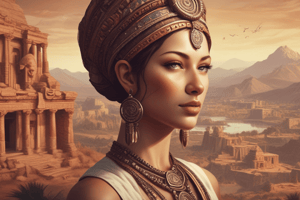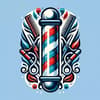Podcast
Questions and Answers
How did the advent of mass production impact the field of cosmetics?
How did the advent of mass production impact the field of cosmetics?
Mass production allowed for wider access to cosmetics, leading to increased demand and more affordable products. This also allowed for more specialized products for different needs.
What role did chemical advancements play in the evolution of cosmetics?
What role did chemical advancements play in the evolution of cosmetics?
Chemical advancements enabled the creation of more tailored and effective products, catering to specific skin types and concerns. They also improved the quality and safety of cosmetic products.
Explain the importance of understanding the science behind cosmetics.
Explain the importance of understanding the science behind cosmetics.
Understanding the science behind cosmetics is crucial for developing safe and effective products. This includes studying ingredients, their effects on skin and body, and ensuring product safety through testing and regulations.
Describe how technological advancements have impacted the field of cosmetology.
Describe how technological advancements have impacted the field of cosmetology.
What are some key concepts in the development of modern cosmetics?
What are some key concepts in the development of modern cosmetics?
Explain why cosmetics were used in ancient civilizations beyond mere aesthetics.
Explain why cosmetics were used in ancient civilizations beyond mere aesthetics.
Describe how the Egyptian people incorporated cosmetics in their daily lives.
Describe how the Egyptian people incorporated cosmetics in their daily lives.
Explain how the use of cosmetics differed between Ancient Egyptian and Ancient Greek/Roman cultures.
Explain how the use of cosmetics differed between Ancient Egyptian and Ancient Greek/Roman cultures.
Explain the key characteristics that defined cosmetics in the Medieval period.
Explain the key characteristics that defined cosmetics in the Medieval period.
Contrast the use of cosmetics in the Renaissance/Baroque period with the Medieval period.
Contrast the use of cosmetics in the Renaissance/Baroque period with the Medieval period.
Explain how the development of cosmetics was impacted in the 18th and 19th centuries.
Explain how the development of cosmetics was impacted in the 18th and 19th centuries.
Describe how the 20th century revolutionized the development and use of cosmetics.
Describe how the 20th century revolutionized the development and use of cosmetics.
Explain the key factors that have shaped the history of cosmetic science.
Explain the key factors that have shaped the history of cosmetic science.
Flashcards
Mass Production in Cosmetics
Mass Production in Cosmetics
The process of manufacturing large quantities of cosmetics to make them widely available.
Tailored Products
Tailored Products
Cosmetics designed specifically for different skin types and concerns.
Cosmetology and Science
Cosmetology and Science
The field that combines cosmetic application with scientific understanding of skin, hair, and nails.
Chemical Advancements
Chemical Advancements
Signup and view all the flashcards
Product Safety Testing
Product Safety Testing
Signup and view all the flashcards
Historical Use of Cosmetics
Historical Use of Cosmetics
Signup and view all the flashcards
Egyptian Beauty Ingredients
Egyptian Beauty Ingredients
Signup and view all the flashcards
Greek and Roman Cosmetics
Greek and Roman Cosmetics
Signup and view all the flashcards
Medieval Cosmetics
Medieval Cosmetics
Signup and view all the flashcards
Renaissance and Baroque Beauty
Renaissance and Baroque Beauty
Signup and view all the flashcards
18th and 19th Century Advances
18th and 19th Century Advances
Signup and view all the flashcards
20th Century Cosmetic Science
20th Century Cosmetic Science
Signup and view all the flashcards
Natural vs. Innovative Ingredients
Natural vs. Innovative Ingredients
Signup and view all the flashcards
Study Notes
Early Stages of Cosmetology
- Cosmetics have existed for millennia, evident in ancient civilizations.
- Early cosmetics were linked to religion, social standing, and aesthetics.
- Ancient civilizations (Egyptians, Greeks, Romans) developed complex beauty practices.
- These practices included applying substances for cosmetics and practical reasons (sun protection, wound healing).
Ancient Egyptian Beauty Practices
- Egyptians had elaborate beauty routines.
- Kohl, a dark mineral or soot-based substance, was used around the eyes for cosmetic and protective purposes.
- Henna was used to color hair and nails.
- Oils and resins were used for moisturizing and perfuming the skin.
Ancient Greek and Roman Beauty Practices
- Greeks and Romans valued beauty and hygiene.
- Cosmetics were used to enhance features.
- Texts describe recipes for perfumes, creams, and hair dyes.
- Romans particularly favored perfumes and oils.
Medieval Cosmetics
- Medieval European cosmetics predominantly used herbs and natural ingredients.
- Beauty ideals centered on skin, influenced by religion and social norms.
- Beauty recipes were often secret.
- Beauty practices, while present, lacked the variety and complexity of earlier periods.
Renaissance and Baroque Cosmetics
- The Renaissance & Baroque eras saw a renewed interest in aesthetics.
- More ornate and elaborate cosmetic approaches emerged.
- Focus on skin tone and complexion.
- Pigments and paints entered into cosmetic practice.
- Face powders and rouge became more common.
18th and 19th Century Beauty Practices
- The 18th and 19th centuries saw the rise of a scientific approach to beauty products.
- Increased emphasis on hygiene and cleanliness.
- Rise of commercial cosmetics in the later 19th century.
- Natural ingredients were utilized along with inventive creations.
20th Century and Modern Cosmetics
- The 20th century revolutionized cosmetic science and technology.
- Increased research on ingredient safety and effectiveness.
- Mass production led to wider access for cosmetics.
- Products were created catering to diverse skin types and concerns.
- Professional hairstyling and makeup services gained popularity.
- Targeted skincare/makeup products catered to various needs and preferences.
- Chemical advancements allowed for more personalized products.
Modern Cosmetology and Science
- Modern cosmetology is a multifaceted field, blending product application with scientific understanding of skin, hair, and nails.
- Scientific knowledge fuels effective and safe product design.
- Technology significantly boosted cosmetic procedures' quality and efficacy.
- Formulations, stability, and quality assurance are crucial in product development.
Cosmetic Science
- Understanding the science behind cosmetics is essential for achieving safety, effectiveness, and quality control.
- The study of chemical ingredients and their effects on skin tissues.
- Investigation of product physical and chemical properties.
- Ensuring product safety through toxicity testing and regulations.
- Advanced techniques facilitate tailored, specific products.
Studying That Suits You
Use AI to generate personalized quizzes and flashcards to suit your learning preferences.




